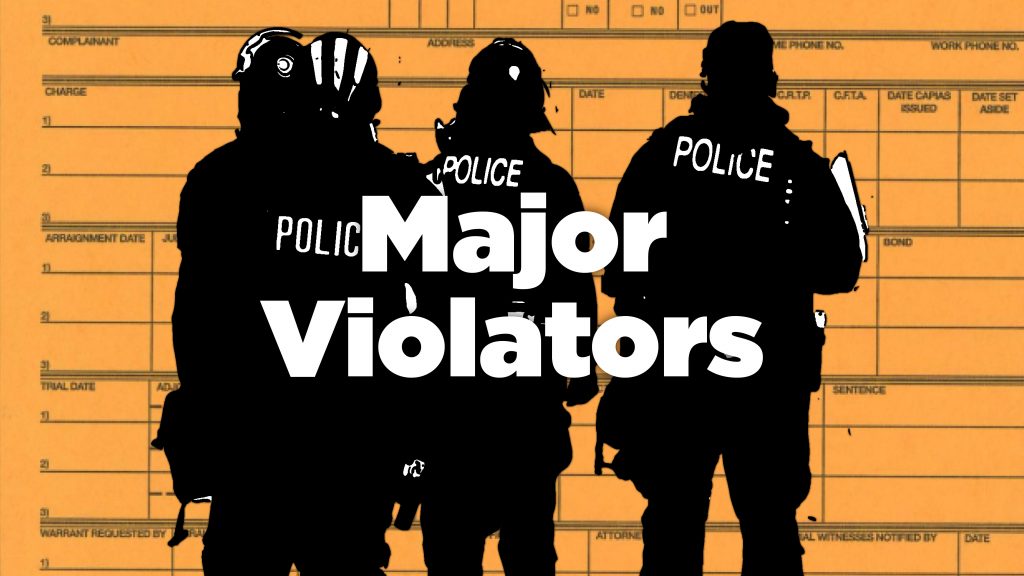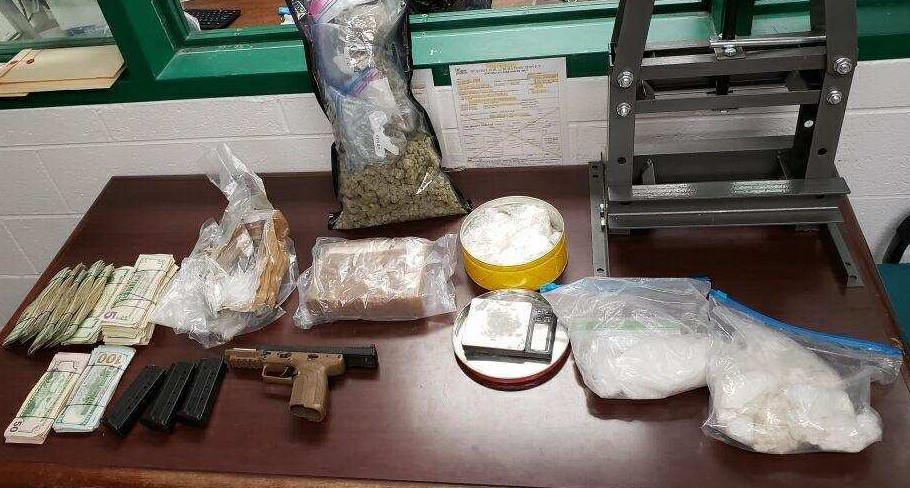Major Violators: Investigators find systemic corruption in Detroit’s top drug enforcement unit
The Operation Clean Sweep Task Force — which found evidence of fraud, forgery and perjury — is “the most in-depth intra-departmental investigative inquiry in recent Department history.”

Photo illustration by Sophia Jozwiak/WDET
This is the first installment of WDET’s reporting on the investigation of the Major Violators Unit that occurred between 2019 and 2021. Documented in a 210-page report, its findings present an unprecedented profile of the Detroit Police Department’s top drug enforcement unit and the systemic corruption found within its ranks.
Policies broken. Documents forged. Money stolen.
Detroit’s “elite” drug enforcement unit failed to accurately track more than $1.3 million in cash and dozens of paid informants over the course of a decade.
An endless cycle where members of the Major Violators Unit cut deals with drug dealers instead of arresting them, prompting “concerning ” allegations of theft against law enforcement.
The fund — used as an “open checkbook ” — left a money trail with “no logical path” for public corruption investigators to follow, despite “significant evidence” of crimes by narcotics officers.
Thousands of raids, approved by Wayne County prosecutors, many based on falsified search warrant affidavits with cut and paste errors.
A 30-year-long culture of entitlement, poor records keeping, lax oversight and declining performance that permeated throughout a unit operating as “an entity unto itself.”
Hundreds of would-be criminals released back into Detroit neighborhoods.
These are just some of the findings of the more than 200-page report into public corruption at the Detroit Police Department obtained by WDET. The account follows a sprawling 27-month internal investigation that implicated nearly half of the 31 officers serving in the city’s Major Violators Unit.
Read the report: Investigation of the Major Violators Corruption Incident
The Operation Clean Sweep Task Force, a team of 26 city, state and federal investigators, conducted dozens of interviews and pored over thousands of documents, finding evidence of overtime fraud, forgery, false affidavits and perjury in what investigators call “the most in-depth intra-departmental investigative inquiry in recent Department history.”
The report’s subjects, Major Violator officers, raid commanders and their crew chiefs, go unnamed throughout the report. So do the dozens of drug traffickers who spoke about their conduct.
By the end of the probe in November 2021, 12 officers retired or resigned after being implicated in the investigation. They were sergeants and corporals, veterans of the city police force, with some serving in Detroit for decades. The report yielded dozens of policy recommendations and reported changes in police procedure.
But six months after the report was finalized, the 15 officers identified by the report as having “serious misconduct allegations ” have not been charged.
Some remain on the job.
Obtaining the report
Following DPD’s announcement that the Operation Clean Sweep Task Force had disbanded last November, WDET made numerous attempts to obtain a copy of the public corruption investigation report, including direct appeals to DPD communications officials and Freedom of Information Act requests. All went without response.
Only after WDET published a story that Wayne County prosecutors were still waiting for more evidence against the Major Violator officers did Detroit police officials provide WDET a copy of the report.
Since then, the 210-page report has been made publicly available on the city’s website.
“It’s still an open and active investigation at this point,” said Second Deputy Chief Rudy Harper. “DPD has submitted multiple warrants to the Wayne County Prosecutor’s Office for their review, and the Department continues to work with the prosecutor’s office on these matters.”
But the existence of the report came as a surprise to the Wayne County Prosecutor’s Office.

“We were never informed by DPD that a Major Violators report came out until [WDET] sent us the link in your email,” said Wayne County Prosecutor Kym Worthy in a written statement.
While the report lists a Wayne County Prosecutor’s Office Special Operations chief and three assistant prosecuting attorneys as having reviewed information obtained during the investigation, Worthy refutes her office’s cooperation in the effort.
“It is terribly misleading to say that WCPO participated in the report, because we did not. Our contact was limited to briefings on certain aspects of the matter very early on. Later, we were briefed on three warrant requests that were submitted to us.”
“It is very odd that we were not contacted when the report was published,” Worthy adds.
Worthy did not address WDET’s questions regarding her office’s approval of potentially hundreds of falsified search warrant affidavits.
“To date we have received only the three warrant requests related to the Major Violators investigation,” wrote Worthy. “These three warrant requests were discussed with DPD and were each returned for further investigation that is needed before charging decisions can be made. These cases are considered open investigations by WCPO.”
Operation Clean Sweep has in-part been publicly reported since its inception. Senior DPD officials gave several updates to the media and the Detroit Board of Police Commissioners while the investigation was ongoing between 2019 and 2021.
“I’m not making excuses. I’m going to make changes,” said Detroit Police Chief James White during a November press conference announcing the end of the probe. “That type of conduct is unacceptable. And if it’s a member of this police department, it is my job to ensure that that’s not the case.”
DPD officials say the final corruption report was released to the police commission and other agencies following the report’s completion on November 26, 2021. The following week, interim BOPC secretary Melanie White stated the board had received the report, according to transcripts of the public meeting.
But after an analysis of the public meetings that followed, WDET could not identify subsequent discussions about the report’s findings or any instances where the entirety of the document was presented to the public and published online.
A former head of Detroit’s police oversight panel could not recall receiving the full report but remembers senior police leadership’s announcements on policy changes to be a sufficient response.
“We relied on the chief’s report and how they handled it,” said Police Commissioner Willie Bell, who was board chair of the BOPC for most of the investigation’s duration.
Police commissioners discovered the report had been sent to their emails last December. Still, many failed to recall reading it, with one blaming board administrators for holding back on releasing pertinent documents
“I should have received a hard copy,” said Police Commissioner Willie Burton. “There should have been discussions. Portions of that document should have been read on the record to show transparency.”
“Oversight is dead in the city of Detroit,” Burton adds. “Someone needs to be disciplined.”

WDET’s requests to interview Chief White and the report’s lead author, DPD Professional Standards Bureau Director Chris Graveline, were denied. Additional questions regarding details of the report and the current makeup of the Major Violators Unit were not answered by DPD in time for the publication of this story.
A request to speak with James Craig, the former Detroit police chief who oversaw the formation of the Major Violators Unit and the Operation Clean Sweep Task Force, was denied. Craig appears by name throughout the report.
“Craig has displayed nothing short of transparency and leadership during his time as the Chief of Police for the city of Detroit,” said a spokesperson for Craig, who is running for the Republican gubernatorial nomination in Michigan.
Requests for comment to the U.S. Department of Justice and Michigan Attorney General’s Office went unreturned before this story’s publication
A spokesperson for the FBI deferred to DPD for any comment on the report.
New name, old problems
Former Detroit police chief James Craig’s reorganization of the city’s top drug enforcement unit was a failed attempt to weed out corruption among officers. According to investigators, several familiar faces from the corruption-tainted Narcotics Section joined the newly created Major Violators Unit in a short time.
The FBI indicted Narcotics police lieutenant David Hansberry and officer Bryan Watson for conspiring to rob drug dealers of their money and drugs. In court filings, the two were accused of being “dirty cops,” splitting the profits of drug sales from narcotics they seized. In one raid, federal investigators found the pair stole $900,000 — taking money “off the top” of a multimillion-dollar cash seizure that followed a Mexican cartel cocaine sale.
In 2017, Hansberry was sentenced to 12-and-a-half years in prison, and Watson received nine years in prison for the extortion and robbery charges.
In the wake of the scandal, Craig disbanded the Narcotics Section and reassigned its leadership. Nearly 80% of officers were moved to other areas in the department. A total of 37 officers were removed from the former drug enforcement unit, according to investigators.
In 2014, Craig formed the Major Violators Unit, a drug enforcement unit different in name but nearly identical in purpose.

The restructuring came when federal oversight of DPD was winding down. Later that year, U.S. District Judge Avern Cohn ordered an end to the two Justice Department consent decrees in place since 2003. The independent monitor tasked with investigating allegations of police misconduct and analyzing police procedures would transition out. The court formally ended Detroit’s oversight in 2016 after 13 years of federal supervision.
When federal investigators returned to Detroit, they found that the fledgling Major Violators Unit needed a “quick fix” to its problems. The new officers were overwhelmed with hotline tips and struggled to relate to their sources. The unit faltered under new leadership. In general, they were making fewer large-scale drug seizures.
Command officers decided to “beef up” the unit and ask old colleagues for the job.
In September 2015, a former Narcotics Section lieutenant joined the Major Violators Unit, along with a former sergeant and eight other officers. That trend continued, so by 2019, a total of 16 previously reassigned officers returned to drug enforcement.
When the investigation began, members of the former Narcotics Section accounted for every other officer in the Major Violators Unit. Many of those officers came under intense scrutiny from the Operation Clean Sweep Task Force, after one member became the center of a new corruption investigation.
A drug dealer records a bribe
The federal bribery indictment of Detroit police officer Michael Mosley and the launch of the Operation Clean Sweep investigation started with a phone call from a drug dealer.
In March 2019, the Major Violators Unit raided a home in Detroit’s 8th Precinct, which found over three kilograms of cocaine and heroin and six firearms. The raid was considered a major narcotic seizure that should have required command notification.
But the alleged drug dealer, identified as Dealer M in the report, was released at the scene by members of the unit. Investigators note that the decision was exceptional, as Dealer M had previous convictions of violent crimes like assault with intent to murder.
Mosley, a crew chief who was hired by DPD in 2000 and spent more than 11 years on Detroit’s various narcotics units, is said to have taken a written confession from Dealer M.
In the following weeks, Dealer M recorded a phone call with Mosley, identified as Member #16 in the report, who agreed to accept $15,000 in cash bribes in exchange for the return of his signed statement from the raid. The drug dealer then contacted the FBI’s Public Corruption Unit, which observed Mosley accept the money.
Mosley was indicted on two counts of bribery on Aug. 22, 2019 and forced to resign. He was sentenced to 18 months in federal prison in August 2021 after pleading guilty to the crimes.
The indictment saw the formation of the Operation Clean Sweep Task Force. The team was primarily comprised of internal affairs investigators at the Detroit Police Department. They were joined by FBI public corruption agents, including members of the Michigan State Police and the Michigan Attorney General’s Office.
The investigation started by scrutinizing Mosley’s actions at the Major Violators Unit.
Investigators found Mosley was a frequent caller of a police hotline meant for sourcing drug tips. The tip line was often a source for Major Violators Unit drug raids.
A narcotics officer reported Mosley had instructed others in the unit to call in their own tips.
While investigators determined there was “no way” to prove the allegations that officers were fraudulently calling in their own tips to generate leads before raids, they found members of the Major Violators Unit contacted their own hotline more than 500 times between 2010 and 2019.
Investigators found Mosley had submitted 30 problematic search warrant affidavits from 2018 to 2019. As a result of his broad pattern of false statements, two incarcerated men were released by the Michigan Department of Corrections.
Mosley’s raid team, a group of seven narcotics officers, would be identified by investigators to be the “most problematic enforcement crew in terms of misconduct and non-arrests of drug dealers.”
The flip cycle and an “open checkbook”
Drug dealers had an understanding that the regular theft they experienced at the hands of Detroit’s top narcotics enforcement unit was the “price of doing business” in the city, according to 16 individuals who spoke with investigators.
The dealers claim members of the Major Violators Unit were taking their money, stealing hundreds if not several thousands of dollars, in exchange for their immediate freedom.
The drug dealers had all been “flipped.”
Officers would pick up narcotics traffickers during raids. Sometimes they possessed hundreds of grams of cocaine or heroin. Or they had multiple guns. Many confessed to being drug dealers on site.
But instead of an arrest, police would offer them a deal.
The option was simple — the drug dealers could get jail time or “work off” their original charge by providing information on some other illegal narcotics activity.

They would become unpaid and unregistered confidential informants.
In theory, they could help police catch a “bigger fish” in Detroit’s drug underworld.
While the practice has reportedly ceased, agreeing to the flip was a popular choice for would-be drug offenders.
In 2019, the Major Violators Unit reported arresting 168 people on drug and weapons-related felony charges. Investigators found the unit released nearly half of them on-site, calling it a “problematic” response.
In one such incident, an observed drug dealer identified as Dealer DM, was detained and then let go, despite being armed and possessing over 200 grams of cocaine and 125 grams of heroin.
The release concerned police investigators, after the dealer in their 50s became engaged in a physically abusive and sexual relationship with a teen girl. Dealer DM is said to have been named as the offender in three separate violent incidents after their release.
In 2018, one crew was found to have flipped most of the drug dealers it encountered, releasing 7 out of every 10 narcotic suspects back onto the streets of Detroit.
But investigators found “zero evidence” that the drug enforcement unit was working up the ladder toward arresting more serious offenders.
Officers rarely followed up with criminal prosecution on flipped offenders. Investigators said many confidential informants had “little or no basis on which to establish their credibility” and provided no useful information. Still, the flips counted toward the Major Violators Unit arrest statistics, “artificially inflating” their performance.
The flip was identified as the “number one practice” that exposed systemic corruption in the Major Violators Unit, leading to numerous “false sworn statements and lies” in police reports.
“The practice of flipping undermines the criminal justice system by the police officer on the street becoming the sole arbiter of who are arrested, charged and ultimately convicted,” investigators wrote.
The flipping process lacked a centralized documentation system, relying heavily on scant handwritten notes and “cookie cutter” police reports.
Investigators would have similar criticisms for the unit’s management of paid informants.
Many of the cash transactions between members of the Major Violators Unit and the drug dealers they employed as Sources of Information went unaccounted for.
During their audit, investigators found DPD had registered 833 paid police informants between 1989 and 2019. By the time the Operation Clean Sweep Task Force formed, 98 were still active.
Between 2009 and 2019, investigators discovered the department had paid more than $1.3 million from its paid informant fund, registering over 9,700 payments. The highest-paid informant was given a one-time $250,000 lump sum, a payment connected to the multimillion-dollar cash seizure that led to the downfall of narcotics officers Hansberry and Watson. The next highest-paid source received nearly $85,000 throughout hundreds of transactions.
Investigators interviewed 19 paid informants, and many relayed suspicious activities by the Major Violators Unit members.
“I suspected something,” one paid informant told the task force. “I suspected that they might be keeping some of the money.” One source said the fund was used like an “open checkbook.”
Investigators determined the fund program was “at the center of corrupt police misconduct.”

According to DPD officials, Operation Clean Sweep was a “sterling example of a department that takes officer misconduct seriously and deals with it transparently.” After scores of interviews and the review of thousands of documents, investigators determined the potential criminality of officers was systemic to the Major Violators Unit, its members “intentionally and purposely” engaging in misconduct.
But 32 months after the investigation began, no charges have been filed, raising the question of what more needs to be uncovered before officers face the consequences of their acts.
“Every law enforcement officer’s action matters and each one has the potential to change the outlook of the entire profession,” investigators write near the report’s conclusion.
“If you do not think so, just look at what occurred in Minneapolis, Minnesota in the summer of 2020.”
Update June 2, 2022: WDET has revised this article to clarify Police Commissioner Bell’s past title.
